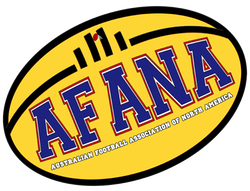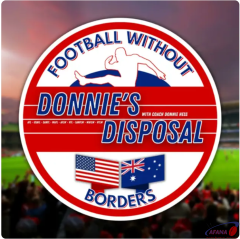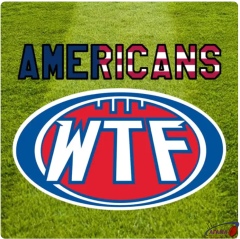FOUR LIVE MATCHES ON PAY-TV
Report by Johnson Leung for AFANA in Melbourne
The year-long tussle between Foxtel and the Seven and Ten networks over the telecast arrangements for the next five AFL seasons has finally come to an end, but not without last-minute dramas.
Foxtel had been locked in a stand-off with Seven and Ten, which hold the TV rights to AFL matches from this year to 2011, for the past 12 months. But with just 15 days to go until the start of the pre-season competition, the deal was finally done with intervention from AFL chief executive Andrew Demetriou. There were some late jitters before final contracts were signed on February 8, with the official announcement postponed twice because of last-minute haggling. An article lauding the virtues of a new deal appeared on the AFL website at 2.30pm but was withdrawn soon later.
AFL chief Andrew Demetriou appeared before an impatient media at 4.25pm - almost two hours after the league said it would make a major announcement. "We waited for 399 days and we thought we'd go an extra couple of hours," he joked.
Foxtel will pay Seven and Ten A$315.5 million over five years, comprising A$50 million in cash for the first year with an increase of 3% compounding each year, plus A$10 million in contra advertising and about A$12 million in production fees for each year of the contract. The total amount is slightly less than half the A$780 million the two free-to-air networks agreed to pay the AFL last year for the current rights, and the annual outlay is A$10 million less each year than Seven and Ten had previously insisted on.
Austar will make a direct A$5 million contribution to Foxtel to assist it in meeting the annual financial and contra obligations. Fox Sports is responsible for production costs associated with pay-TV's live coverage and will also share Foxtel's contra obligation with Austar.
In a deal Demetriou described as the best broadcasting arrangements in the game's history, Seven and Ten will retain four games a round - including one Friday night and Sunday afternoon game for Seven, and one Saturday afternoon and night game for Ten - as well as exclusive live coverage of the finals series, Grand Final and Brownlow Medal count.
Foxtel will sub-license the AFL rights to the Premier Media Group, who will use the three Fox Sports channels to broadcast four games per round, including one Saturday afternoon and night game, and one Sunday afternoon game and the new twilight game, as well as other AFL content. The Fox Footy channel, which closed after last year's Grand Final, will not be revived.
Other highlights of the deal include:
- All matches involving Adelaide, Brisbane, Fremantle, Port Adelaide, Sydney and West Coast will be broadcast on free-to-air television in their home markets either live or on same day delay (up to three hours in SA and WA);
- Three matches will be broadcast in full in Victoria on free to air television and pay-TV on Sundays for the first time;
- Friday night football will be telecast live into NSW and Queensland for the first time (via pay-TV);
- Foxtel will alternate with Ten in having first pick of the two weekly Saturday afternoon games. Ten have first right to Saturday afternoon games for the first 10 rounds, then Foxtel for next 6 rounds, then Ten for the last six rounds. Ten will then show the best Saturday night fixture with Foxtel televising the other Saturday night game;
- Foxtel and Austar will enjoy replay rights to every game of every round of the season, including the finals;
- Blackspots in NSW, Queensland and other regions will be eliminated; and
- Foxtel and Austar will broadcast half of pre-season NAB Cup matches (including one semi-final), with the other half split between Seven and Ten. For this year's tournament, Foxtel and Austar will exclusively broadcast live four first-round matches, two quarter-finals and one semi-final, with the other eight matches equally split between Seven (which will cover the GF) and Ten.
But the AFL has refused Foxtel's demand for a guaranteed fixture on each weekend of the June split round, along with the network's bid to rid its matches of ground signs involving competitors such as Optus.
Demetriou said the league was delighted with the agreement, which would see more live coverage of matches around Australia. "The aim was to have more of our football supporters, more people in more locations, able to watch games either live or near live than ever before," he said. "This agreement ... underpins the greatest investment into our game in the history of Australian football, which will secure all our 16 AFL clubs and provide record investment for the game at all levels."
Demetriou denied questioning that grassroots fans would now be worse off because they would have to pay the A$634.80 annually (A$52.90 monthly) to subscribe to Foxtel. Asked about fans who would not be able to see their teams live on free-to-air TV, Demetriou replied: "I would encourage everyone to subscribe to Foxtel."
Channel Ten chief executive Grant Blackley said the long and extensive negotiations with Foxtel had provided a commercial outcome and a telecast schedule that was in the best interests of all parties. He said he was looking forward to the introduction of High Definition coverage of Saturday night matches.
Channel Seven Melbourne managing director Ian Johnson said the lengthy negotiations had been worthwhile, and his network was looking to build a new partnership with the league.
Foxtel chief executive Kim Williams said his company had been firmly committed to the AFL since it commenced broadcasting the code in 2002 and was pleased to continue its relationship by showing at least four live games each week. Williams said despite the protracted negotiations, it was logical for all parties to reach agreement. "We made our trading terms clear and Austar partnered up with Foxtel very generously in the packaging of the financial offer to our colleagues at Ten and Seven in a way that was seen to be satisfactory to them," he said.
Austar chief executive John Porter said regional Australians would also benefit from the deal as they will have the opportunity to see more AFL than ever before.
Under the Seven-Ten consortium's agreement with the AFL, it must show all eight games a week live on free-to-air TV if it failed to on-sell up to four games a week to pay-TV. Seven's negotiating position was that it made greater economic sense to show all eight games a week, even though Seven and Ten would be programming against each other on Saturdays and Sundays, playing havoc with their programming schedules, than to allow Foxtel access at bargain basement prices. With the extra Austar money, plus the new contra offer, the Foxtel offer has reached Seven's demand.
If a deal with Foxtel had not been struck, Seven would also have faced serious clashes with its new V8 Supercars contract and a scheduling nightmare with AFL Friday night games. While these would give the network strength in Victoria, South Australia, Western Australia and Tasmania, it would have faced a ratings disaster in NSW, ACT, Queensland and Northern Territory, where Nine will broadcast two National Rugby Legue matches on Friday nights. From late November last year to January this year, Seven was negotiating with SBS and community station Channel 31 to offload the Friday night matches, but with Foxtel on board the scheduling problems disappear.
Analysts expect Ten would be hit the most if a deal was not reached with Foxtel. They estimate it would increase Ten's TV costs by about 5 per cent, crimping its earnings at the same time as the network's major shareholder, Canadian media group CanWest, is reviewing its 56% stake in Ten and looking for a potential buyer.
Observers also believe Foxtel was under pressure to do a deal with the consortium. Austar was increasingly concerned that its subscribers would react strongly against the loss of AFL - a view shared by Foxtel co-owners News Limited (which holds a 25% share) and Telstra (50%).
The absence of AFL would leave a huge hole in Foxtel's winter sports schedule, potentially alienating subscribers. For Fox Sports, co-owned by News and Publishing and Broadcasting Limited, it would mean a drop in advertising and subscription revenues in the southern states.
It is understood the AFL also told Foxtel that if it abandoned the sport, or sought to set a new, lower floor price for future rights, it would not be in a strong position to negotiate in 2010, when the next agreement will be on the table, with no first and last rights agreements in place.
Seven's first official AFL match since the 2001 Grand Final will happen on Friday, February 23, when North Melbourne plays Collingwood in a NAB Cup match from Carrara on Queensland's Gold Coast. It will hold a dress rehearsal for its commentary and production team during Melbourne's one-off intra-club practice match at Telstra Dome three days earlier.
Background
In December 2005, the late media tycoon Kerry Packer set the scene for a bitter tussle over AFL rights when he approved a A$780 million bid by his company Publishing and Broadcasting Limited for the TV rights to eight games a week from 2007 to 2011, a 40 per cent increase over the cost of rights for the five seasons from 2002 to 2006. Foxtel agreed to contribute A$225 million over five years, or A$45 million a year for four live games a week. Two weeks later, the Seven-Ten consortium agreed to match the PBL bid under a first-and-last option acquired a decade earlier for A$20 million. This meant Seven and Ten had to replicate the PBL deal down to the last detail. PBL's bid was for eight live games a week to be shown on Nine, providing it could on-sell up to four games a week to pay-TV. The Seven-Ten consortium's problem was that it had no agreement with Foxtel, despite having negotiated since March.
For the next ten months, Foxtel refused to budge on the A$45 million offer, arguing that AFL has not been the subscription driver it had hoped for, and said it did not believe the absence of AFL would lead to mass subscriber cancellations.
After talks in Sydney involving Foxtel chief executive Kim Williams, Seven CEO David Leckie and Ten's Grant Blackley broke down in late November, Seven's Ian Johnson said Seven and Ten networks had no option but to show all eight games from 2007, as they were about to book outside broadcast vans, recruit commentators and production staff, and promote the coverage to advertisers. It was during this time that the option of offloading Friday night matches to SBS or community station Channel 31 emerged.
SBS had considered a proposal from Seven to broadcast the Friday night matches into NSW and Queensland via its secondary digital channel. The government-funded broadcaster would take the live feed direct from Seven, the only complication being SBS's inability to carry more than five minutes of advertising an hour.
Seven also approached Channel 31 stations in Sydney and Brisbane to broadcast some matches. But the AFL consistently rejected Channel 31 as a broadcaster as it had doubts about the station's coverage area, and stipulated it would accept only the ABC or SBS as an alternative to Seven to broadcast Friday night football into its two crucial northern markets.
The turning point came in early December when Austar confirmed it was willing to provide some contribution to make Foxtel's bid succeed, and had opened separate negotiations to try to secure AFL games for its subscribers. On December 19, Premier Media Group chief David Malone made an enhanced offer on behalf of Foxtel and Austar (Premier runs the Fox Sports channels on both providers), consisting of A$50 million cash (including A$5 million from Austar for the first time), A$7.5 million contra and a commitment to production costs (about A$12 million) for each year of the 2007-11 deal. Foxtel also put forward a series of demands involving eight exclusive live games into Perth and Adelaide. Seven and Ten rejected the new offer as they demanded A$60 million cash per year, but the possibility of further talks was left open. "We thought it was a good offer," Foxtel's Peter Campbell said after the meeting. "Obviously, Seven and Ten have a different methodology to us."
Austar's John Porter later called the stand-off over AFL rights a "tragedy"."I've never seen a deal in 30 years that made more sense, that didn't get done," Porter said. "It makes a huge amount of sense for the broadcasters, a huge amount of sense for our industry and distributors and, most importantly, it would be a compelling outcome for the viewers."
After Foxtel's enhanced offer was rejected, the long-awaited coin toss to decide the split of AFL Grand Finals between the two networks occurred outside Seven's headquarters at Sydney's Darling Harbour in early January. Channel Ten chairman Nick Falloon, Ten manager of sport David White and Seven CEO Leckie moved onto a pier at the back of Seven's office with Leckie tossing a 20-cent coin and White successfully calling tails as the coin was in the air. As the result, Ten would televise the 2007, 2009 and 2011 Grand Ginals, while Seven would have 2008 and 2010 Grand Finals. The non-grand final host on any given year will broadcast the Brownlow Medal count, the NAB Cup Grand Ginal and the first choice of matches in the first three weeks of AFL finals.
Seven and Ten also tentatively carved up the eight weekly games. Seven were to broadcast one match on Friday night, Saturday afternoon, Saturday night and Sunday afternoon. Ten would show matches on Saturday afternoon, Saturday night, Sunday early afternoon and twilight.
In mid-January Foxtel resumed talks with Seven and Ten during which the contra offer was increased to A$10 million a year. This was seen as a way of satisfying the demands of Foxtel part-owner James Packer, in that Foxtel did not pay Seven more than it had offered to pay Nine in its bid for AFL rights. Although the parties remained at a stalemate, both sides were now coming under mounting pressure to reach an agreement, with the pre-season competition fast approaching.
Desperate in wanting the impasse resolved, the AFL hosted a high-powered gathering of TV heavyweights at league headquarters on February 2. The three-hour meeting, which included Demetriou, AFL chief broadcasting and commercial officer Gillon McLachlan, Foxtel's Williams, Seven's Johnson and Ten's White, ended amicably. An tentative agreement was reached before it was formalised six days later.
Sources: Melbourne Age; The Australian; Herald Sun; AAP; AFL press release; Channel Ten press release
Article last changed on Sunday, February 18, 2007 - 6:17 PM EST






